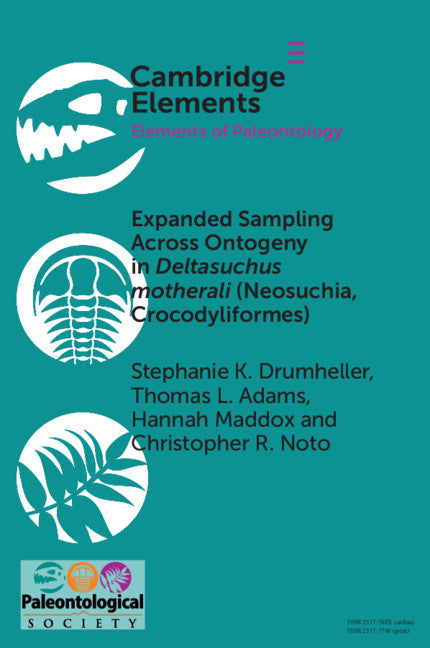Freshly Printed - allow 8 days lead
Couldn't load pickup availability
Expanded Sampling Across Ontogeny in Deltasuchus motherali (Neosuchia, Crocodyliformes)
Revealing Ecomorphological Niche Partitioning and Appalachian Endemism in Cenomanian Crocodyliforms
An ontogenetic series of Deltasuchus motherali helps clarify its niche and resolve a contested part of the crocodyliform family tree.
Stephanie K. Drumheller (Author), Thomas L. Adams (Author), Hannah Maddox (Author), Christopher R. Noto (Author)
9781009005814, Cambridge University Press
Paperback / softback, published 3 June 2021
75 pages
22.6 x 15.1 x 0.3 cm, 0.12 kg
New material attributable to Deltasuchus motherali, a neosuchian from the Cenomanian of Texas, provides sampling across much of the ontogeny of this species. Detailed descriptions provide information about the paleobiology of this species, particularly with regards to how growth and development affected diet. Overall snout shape became progressively wider and more robust with age, suggesting that dietary shifts from juvenile to adult were not only a matter of size change, but of functional performance as well. These newly described elements provide additional characters upon which to base more robust phylogenetic analyses. The authors provide a revised diagnosis of this species, describing the new material and discussing incidents of apparent ontogenetic variation across the sampled population. The results of the ensuing phylogenetic analyses both situate Deltasuchus within an endemic clade of Appalachian crocodyliforms, separate and diagnosable from goniopholidids and pholidosaurs, herein referred to as Paluxysuchidae. This title is also available as Open Access on Cambridge Core.
1. Introduction
2 Age and Geologic Setting
3. Systematic Paleontology
4. Description
5. Phylogenetic Analysis
6. Discussion
7. Conclusions
References.
Subject Areas: Palaeontology [RBX], Evolution [PSAJ], Life sciences: general issues [PSA], Biology, life sciences [PS]


